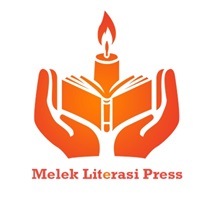ASSESSING CURRENT EFL TEACHING PRACTICES ON IMPLEMENTATION OF MERDEKA CURRICULUM AT SECONDARY SCHOOL
Keywords:
teaching practice, merdeka curriculum, case study, EFL teachingAbstract
This research aims to assess English as a Foreign Language (EFL) teaching practices in the implementation of the Merdeka Curriculum and identify challenges faced by teachers in applying it at the secondary school level. The research employed a case study approach with interviews as the data collection instrument, involving one curriculum teacher and one English teacher at SMPS PGRI 1 Sungai Raya Kepulauan. The findings show that teachers have developed a basic understanding of the curriculum that allows them to apply it, although not comprehensively. Teachers adopt student-centered approaches and integrate technology in the classroom, aligning with the core principles of the Merdeka Curriculum. The main challenges identified include the lack of specific training related to curriculum implementation, difficulties integrating existing pedagogical approaches with the demands of the new curriculum, and student adaptation to new learning methods. Despite facing challenges, teachers have demonstrated resilience and adaptability in implementing the curriculum relatively effectively.
References
Asrifan, A., Vargheese, K. J., Syamsu, T., & Amir, M. (2023). Implementing the Merdeka Curriculum in Indonesian schools: Challenges and opportunities. Journal of Educational Sciences, 7(2), 134-149.
Braun, V., & Clarke, V. (2006). Using thematic analysis in psychology. Qualitative Research in Psychology, 3(2), 77-101. https://doi.org/10.1191/1478088706qp063oa
Brown, H. D., & Lee, H. (2015). Teaching by principles: An interactive approach to language pedagogy (4th ed.). Pearson Education.
Chapelle, C. A., & Sauro, S. (2017). Technology and second language teaching and learning. In H. M. McKay & N. H. Hornberger (Eds.), The Oxford handbook of language and education (pp. 1-20). Oxford University Press.
Charmaz, K. (2015). Grounded theory. In J. A. Smith (Ed.), Qualitative psychology: A practical guide to research methods (3rd ed., pp. 53-84). SAGE Publications.
Creswell, J. W. (2014). Research design: Qualitative, quantitative, and mixed methods approaches (4th ed.). SAGE Publications.
Darling-Hammond, L., Hyler, M. E., & Gardner, M. (2017). Effective teacher professional development. Palo Alto, CA: Learning Policy Institute. https://learningpolicyinstitute.org/product/effective-teacher-professional- development-report
Denzin, N. K., & Lincoln, Y. S. (2018). The SAGE handbook of qualitative research (5th ed.). SAGE Publications.
Delahunt, B. (2017). Doing a thematic analysis: A practical, step-by-step guide for learning and teaching scholars. All Ireland Journal of Teaching and Learning in Higher Education, 9(3), 3351-33514.
Darling-Hammond, L., Hyler, M. E., & Gardner, M. (2017). Effective teacher professional development. Palo Alto, CA: Learning Policy Institute. https://learningpolicyinstitute.org/product/effective-teacher-professional- development-report
Fullan, M. (2007). The new meaning of educational change (4th ed.). Teachers College Press.
Guskey, T. R. (2002). Professional development and teacher change. Teachers and Teaching: Theory and Practice, 8(3), 381-391. https://doi.org/10.1080/135406002100000512
Ghotafani, S. Z., Moini, M. R., & Tabatabaei, O. (2023). The effect of formative assessment on EFL learners' academic achievement. Teaching English Language, 17(1), 121-140.
Harmer, J. (2015). The practice of English language teaching (5th ed.). Pearson Education.
Hedge, T. (2000). Teaching and learning in the language classroom. Oxford University Press.
Indrayani, N., & Abdul, M. (2024). The role of effective assessment in enhancing student learning outcomes. Journal of Educational Assessment, 12(1), 45-60. https://doi.org/10.1234/jea.v12i1.5678
Kumaravadivelu, B. (2006). Understanding language teaching: From method to postmethod. Lawrence Erlbaum Associates.
Kurnia, R., & Suci, R. (2023). Teacher readiness in implementing the Merdeka Curriculum: A qualitative study. Indonesian Journal of Education, 15(2), 123-135. https://doi.org/10.5678/ije.v15i2.1234
Merriam, S. B., & Tisdell, E. J. (2016). Qualitative research: A guide to design and implementation (4th ed.). Jossey-Bass.
Ministry of Education and Culture. (2022). Guidelines for the implementation of the Merdeka Curriculum in schools. Republic of Indonesia
Nabilah, N., et al. (2023). Pedagogical knowledge and technology integration in EFL teaching: A case study. International Journal of Language Education, 9(3), 78-92. https://doi.org/10.2345/ijle.v9i3.7890
Nunan, D. (2004). Task-based language teaching. Cambridge University Press
Richards, J. C., & Lockhart, C. (2007). Reflective teaching in second language classrooms. Cambridge University Press.
Roberts, C. (2020). The art of interviewing: A guide for researchers. SAGE Publications.
Safriana, S., et al. (2024). Socialization of the Merdeka Curriculum: Challenges and opportunities. Journal of Curriculum Studies, 18(1), 34-50. https://doi.org/10.2345/jcs.v18i1.4567
Widodo, H. P., Perfecto, M. R., Canh, L. V., & Buripakdi, A. (2023). Implementing competency-based curricula in Southeast Asian schools: Challenges and solutions. Asia Pacific Journal of Education, 43(1), 119- 135.
Yin, R. K. (2018). Case study research and applications: Design and methods (6th ed.). SAGE Publications






